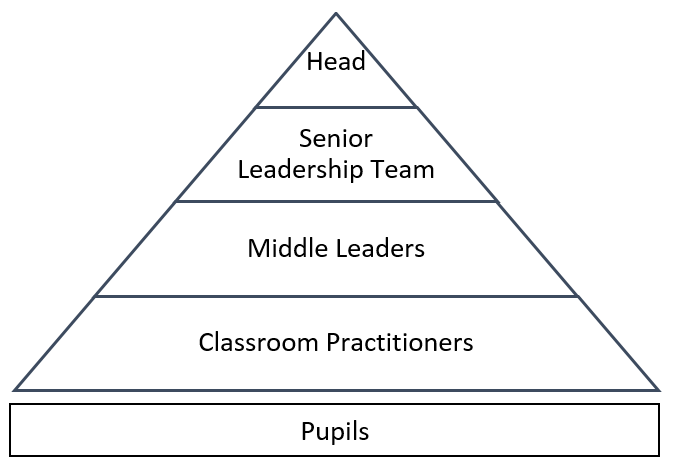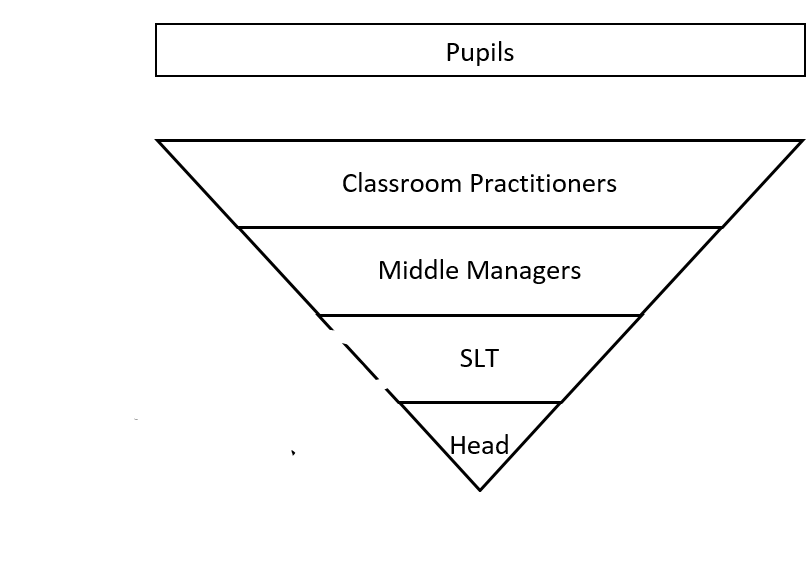|
I recently came across a text called ‘The Servant – A simple story about the true essence of Leadership” by James C. Hunter (2012) and decided to read it. I am not a fan of many leadership books, stereotypically filled with Americanisms, business jargon and born again type quotes. However, there are many points made in ‘The Servant’ that can be applied, not only to our daily lives, but also to schools and the leadership within them.
Ask any teacher in a school why they do their job and hopefully most will answer that they are there in order to make a difference to the lives of the children in their care. If we ask teachers how they implement this many of them will talk about the needs of the children and how they tailor their teaching to the needs of the pupils. In other words, they are there to serve. However, increasingly I hear stories (and have first-hand experience) of schools where teaching methods and learning opportunities are decided not by the class teacher but by the head of the school, thus causing a top down approach. One where the teachers move from ‘serving’ the needs of their pupils to ‘serving’ the wants of their leaders. Why does this happen? Perhaps a salesperson has demonstrated how a scheme of work will improve levels across the school in reading and writing, maybe the head teacher is adequately impressed enough to buy the scheme. Perhaps the head is placed under pressure to quickly implement a whole school approach to a particular problem, such as writing or reading, based upon results or observations by outside agencies. When this happened are the pupils and the needs of the pupils still leading the learning? I doubt it.
It is possible to turn this pyramidal hierarchy on its head. Rather than a top down approach, where teachers alter their teaching methods in order to please the whims of those in the management bands the teachers work to meet the needs of the pupils with the support of all their colleagues.
In his book Hunter explains that being a servant leader means meeting the needs of those below them in the pyramid. Maslow describes our basic needs at the base of his pyramid as food, water, etc. and once these basic needs have been met there are a number of things teachers need in order to carry out their job effectively. A servant leader works to meet the needs of the those below them in the pyramid.
Staff need to be: Appreciated, respected, valued, communicated with, encouraged and listened to. They also need accountability; including ‘healthy’ boundaries, rules of the house, consistency and honesty about their performance. Hunter (2012) explains that feedback ‘is a huge human need.’ Feedback needs to be fair and perceived to be fair across the whole spectrum. In the servant Hunter describes ‘Great leaders’ as those who ‘Hug hard and spank hard!’ Essentially being a great servant leader is finding that perfect balance between ‘hugging and spanking’ metaphorically of course. In practise getting the balance right between praising the positives observed and highlighting areas for improvement, before supporting these improvements. In any given situation the leader should ask the question; “How can I help here? Who can I serve?” What is in it for the servant leader? Not all people respond well to a command style of leadership, many young people cite the reasons for leaving their jobs as someone in management. Many of these people do not quit their jobs. They quit their boss. The media in the UK is currently reporting a desperate shortage of teachers due to teachers leaving the profession. Is this always due to the workload? Is the workload sometimes made even more unbearable by a dictator? Since the dawn of time people have preached the rule. “Love thy neighbour!” I don’t think they mean start a romantic affair with each of them, but they do mean treat people how you would like to be treated. Lead by example and support staff in order to meet their needs. It may be that your staff would like to attend the sports days and Christmas plays of their pupils, for some head teachers this is a “want.” But for some teachers this is a need, if we go back to Maslow, he identifies ‘family’ and ‘love’ as needs. So perhaps allow your staff to attend their child’s class assembly or sports day where practically possible, travel down the pyramid and become the class practitioner for those sessions when they are not there. In addition, attend your children’s events, school will still function without you for an hour or so, as other servants will work to meet your needs. If people are having their needs met they will feel more respected, they will feel secure, happy in their work and they will work harder to be creative, to solve problems and meet the needs of the pupils more effectively. Are you a manager or a leader? I visit many schools and I see various groups of people described at Senior Managers, Senior Leaders, Middle Leaders or Middle Managers. Is there a difference? Hunter describes management as something you do; leadership is the person that you are and the influence and impact you have on the people that you come into contact with. Management is not always synonymous with leadership however; leadership is synonymous with management. You may think that you are a leader simply because you are put into a position of leadership however if the staffroom is feeling mutinous or worse are in open rebellion, then they are definitely not following. If no one is following, then you can’t possibly be leading. One question to ask yourself is if you left. Would people be glad you were there? If not – the fault will probably lie with you! Thanks for reading, Rob Smith This was adapted from ‘The Servant’ A simple story about the true essence of leadership by James C. Hunter published by Crown Business 2012
Amy
16/10/2015 05:53:44 pm
I like this Rob! I've definitely worked under both styles. However one person can be both on different days or about different aspects of their job. Perhaps that comes where the instinctive style is the 'servant' but someone above them is more dictatorial. In which case, someone needs to get Nicky Morgan to read this book!
Russ
16/10/2015 09:12:06 pm
Fantastic blog piece, some SLT are so far removed from the pupils it's scary. Know of one school not far away that the SLT refers to the pupils as "customers" in a similar vein to NHS or Social Services. They have lost sight of why we do the job. This post should be shared in every staff room.
Jane T
17/10/2015 08:05:41 pm
Well done Rob shall read the book. I do believe we need to honour the 'teacher' in everyone (been reading a lot around Buddhism!) and empower each other
Emma
18/10/2015 10:47:41 am
This is so true, I have left a school due to management just like this and now being a manager myself try to keep in mind that we are all here for the children - not Ofsted, the LEA or anyone else. Comments are closed.
|
Archives
July 2020
Categories
All
|


 RSS Feed
RSS Feed
